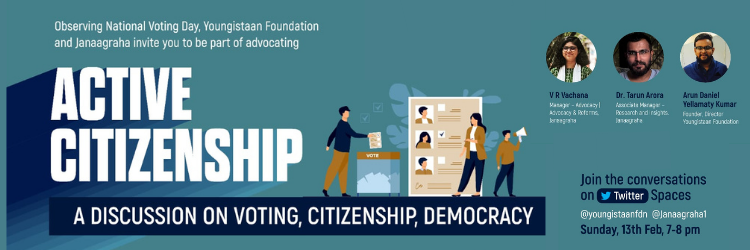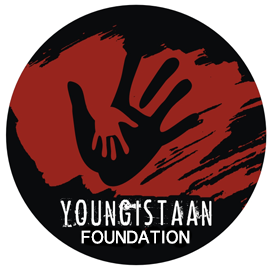
Youngistaan Foundation and Janaagraha held a Twitter Spaces discussion on Active Citizenship to engage in conversation on voting, citizenship, democracy and more on 13 February 2022 in observance of National Voting Day in India.
This important discussion featured the following key speakers from Janaagraha and Youngistaan Foundation who shared their expertise and knowledge in their respective areas with the 450+ people in attendance:
V R Vachana – Manager of Advocacy and Reforms at Janaagraha
Tarun Arora, Ph.D. – Associate Manager of Research and Insights at Janaagraha
Arun Daniel Yellamaty – Founder and Director of Youngistaan Foundation
Listen to the hour-long discussion on Twitter Spaces here:
The Active Citizenship discussion opened for questions and those in attendance had the opportunity to share their views and ask the following important and relevant questions:
- Would you define what active citizenship is and is there a way to operationalize this concept?
- Why is the voter turnout lower for the municipal elections compared to the Lok Sabha or Assembly elections?
- In the context of citizenship and the delivery of public services across India, are there any findings to suggest how important local corporators are at the ground level?
- Do the citizens understand the different roles of the MP, MLA and councillors?
- Why should young people be active in democratic processes?
- In the previous election, women’s voting participation was of a similar rate to men. Will this help bring change in society?
- As we discussed, there is already good participation by women in voting, even though we have issues in voter participation. So what can we do regarding this?
- What are the responsibilities of citizens as well as elected representatives?
- How are RTI and PIL (as an example) useful in making elected representatives accountable to the citizens?
- It has been a decade since NOTA was introduced. How significant is NOTA today?
- If NOTA has no teeth and the cost of re-elections are high, should NOTA be done before the election?
- Why should youth be engaged in between elections?
- Can Bala Janaagraha be used in a broader way to see that young people start taking part in ward level meetings, etc.?
- Do urban youth respond to the fact that their involvement is crucial to not only their futures but that of the entire state and country?
- In order to facilitate electoral participation, can voting be made mandatory?
- Does the idea of “one nation, one election” erode the states’ federal autonomy?
- Is block voting a hindrance to democratic voting processes?
- How can we improve the participation of young people in politics?
- Why should young people be engaged in creating social change?
- Once the government is formed, how do we challenge the system which appears to have one-way communication?
The three speakers have been actively involved in the areas of youth engagement and active citizenship with Youngistaan Foundation who has engaged over 50,000 young people to transform the lives of the underserved and Janaagraha who works with citizens to institute reforms to city governance.
“When you have concerns, engage closely with the political fraternity and make your voices heard on the relevant platforms.”
V R Vachana of Janaagraha
“There are 3 main components that define active citizenship: knowledge, participation and engagement. When a citizen is fully aware of these components and can/does participate in them, this is how we measure or define active citizenship.”
Tarun Arora, Ph.D.
“When young people start asking the right questions to the right people, things start to change. No matter how simple the issue, ask questions and seek change.”
Arun Daniel Kumar Yellamaty
This Twitter Spaces discussion is a part of our Active Citizenship initiative which you can read more about here! If you are interested in being a part of our active citizenship initiative or if you would like us to hold an active citizenship session in your school, college, workplace or community, get in touch with Youngistaan Foundation!





